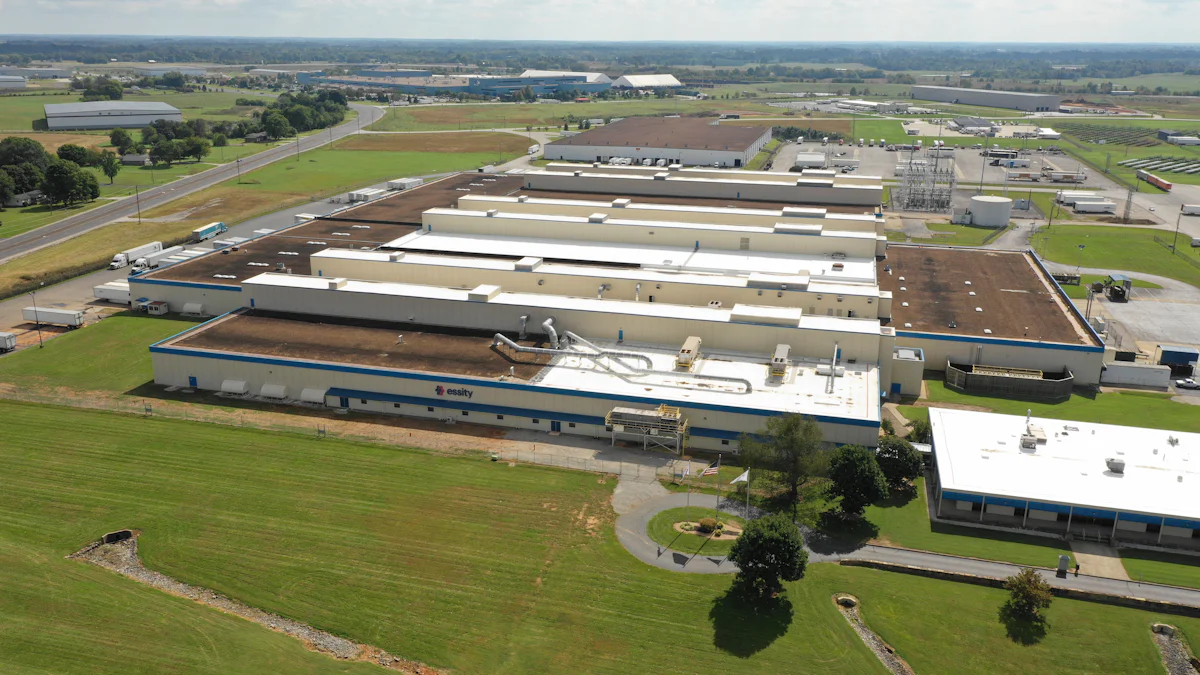Adopt Intelligent Supply Chains Before It’s Too Late

Businesses today face a rapidly changing market where agility and efficiency are critical. Traditional supply chains often struggle with delays, inefficiencies, and cascading disruptions that can cripple operations. A single failure in these outdated systems can halt production entirely. Intelligent supply chain platforms offer a solution by enhancing decision-making, automating repetitive tasks, and providing real-time visibility. Companies using these platforms report a 25% reduction in lead times and improved flexibility. With 70% of professionals agreeing on their importance for market expansion, adopting these platforms is no longer optional—it’s essential for survival.
Understanding Intelligent Supply Chain Platforms

What Makes a Supply Chain Platform "Intelligent"?
Intelligent supply chain platforms stand out because they harness advanced technologies to transform traditional operations. These platforms rely on tools like Artificial Intelligence (AI), the Internet of Things (IoT), and blockchain to enhance efficiency and adaptability. AI and machine learning enable predictive insights, while IoT devices provide real-time tracking of goods. Blockchain ensures secure and transparent data sharing across the supply chain.
Unlike traditional systems, intelligent platforms excel at managing vast amounts of data. They offer seamless collaboration between suppliers, partners, and customers, ensuring faster responses to market changes. These platforms also improve decision-making by leveraging real-time data, which reduces delays and enhances operational agility. Businesses using intelligent supply chain platforms can adapt quickly to disruptions, making them more resilient in today’s dynamic market.
Key Features of Intelligent Supply Chain Platforms
Real-time data analytics for enhanced visibility
Real-time data analytics is a game-changer for supply chain management. It provides instant insights into operations, enabling businesses to act swiftly on potential issues. This level of visibility ensures accurate inventory management and reduces reliance on guesswork. Companies can respond faster to market changes, minimizing disruptions and improving overall efficiency.
Predictive and prescriptive analytics for smarter decision-making
Predictive analytics uses historical data to forecast future trends, while prescriptive analytics recommends the best course of action. Together, they empower businesses to make informed decisions. For example, demand sensing tools analyze customer behavior to optimize inventory levels. This reduces waste and ensures products are available when needed.
Automation and process optimization for efficiency
Automation streamlines repetitive tasks, such as order processing and shipment tracking. It reduces human error and speeds up operations. Intelligent platforms also optimize processes like route planning and warehouse management, cutting costs and improving delivery times. These features make supply chain operations more efficient and reliable.
Risks of Delaying Digital Transformation in Supply Chain Management
Falling Behind Competitors
Competitors leveraging advanced technologies to gain market share
Businesses that embrace digital transformation in supply chain management gain a significant edge. Companies like Amazon use prescriptive analytics to optimize inventory and streamline distribution routes. This approach reduces costs and enhances service delivery. On-demand production, powered by AI-driven software, minimizes material waste and eliminates the need for large inventory investments. These advancements allow competitors to respond faster to market demands, leaving businesses with outdated systems struggling to keep up.
Losing customers due to slower, less efficient operations
Customers today expect speed and reliability. Businesses relying on traditional supply chains often face delays and inefficiencies, which can frustrate customers. Real-time tracking and automation, hallmarks of intelligent platforms, ensure timely deliveries and accurate order fulfillment. Without these capabilities, businesses risk losing customers to competitors who can meet expectations more effectively.
Operational Inefficiencies and Higher Costs
Increased costs from outdated processes and systems
Outdated supply chain systems often lead to operational errors like mislabeled packages and incorrect product selection. These mistakes increase costs and waste resources. Overuse of packaging materials and inefficient shipping methods further inflate expenses. Modern platforms eliminate these inefficiencies by automating processes and optimizing operations, saving businesses significant costs.
Inability to adapt to supply chain disruptions
Supply chain disruptions are inevitable, but businesses with intelligent platforms can respond swiftly. Real-time visibility allows companies to track products and materials, while predictive analytics helps forecast potential risks. Without these tools, businesses struggle to adapt, leading to delays and lost revenue. Poor communication and lack of visibility exacerbate the impact of disruptions, making recovery even harder.
Missed Opportunities for Growth
Failure to capitalize on emerging trends and technologies
Intelligent supply chains transform businesses into agile, data-driven entities. They enable collaboration among stakeholders, improving supply and demand management. Companies that fail to adopt these technologies miss out on opportunities to optimize inventory, enhance logistics planning, and stay ahead of market trends.
Reduced ability to meet evolving customer expectations
Modern customers demand fast, reliable service. Intelligent platforms use automation to speed up operations and maintain optimal inventory levels. Real-time monitoring ensures businesses can respond to demand changes promptly. Companies that delay transformation struggle to meet these expectations, risking customer dissatisfaction and loss of loyalty.
Real-World Success Stories with Intelligent Supply Chain Platforms

Case Study: JUSDA and Sharp
How JUSDA helped Sharp reduce logistics costs by 20%
Sharp, a global leader in household appliances, faced rising logistics costs and inefficiencies in managing its supply chain. JUSDA stepped in with its JusLink platform, offering a tailored solution to streamline Sharp's operations. By leveraging AI-driven tools and real-time data, JUSDA optimized Sharp's logistics processes. This included better route planning, enhanced inventory management, and improved coordination across global supply chains. The result? Sharp achieved a remarkable 20% reduction in logistics costs. This partnership highlights how intelligent platforms can transform supply chain operations, delivering measurable cost savings and operational efficiency.
Enhancing global e-commerce logistics with JusLink
Sharp also needed a solution to handle the complexities of global e-commerce logistics. JusLink provided the perfect answer. Its real-time tracking and predictive analytics allowed Sharp to monitor shipments and anticipate potential delays. The platform's automation features streamlined inventory replenishment, ensuring products were always available to meet customer demand. With JusLink, Sharp enhanced its global e-commerce capabilities, reducing order processing times and improving customer satisfaction. This success story demonstrates the power of intelligent supply chain platforms in navigating the challenges of modern e-commerce.
Lessons from Early Adopters
Overcoming challenges in implementation
Adopting intelligent supply chain platforms isn't without hurdles. Businesses often face high costs, data security concerns, and resistance to change. As one expert noted, "Leakage of confidential data is a major concern, as AI systems analyze both structured and unstructured data, raising fears of security breaches." Customization and scalability also pose challenges, especially for companies with unique operational needs. Training employees to use these platforms effectively requires time and resources. However, businesses that address these issues head-on reap significant rewards.
Key takeaways for businesses considering adoption
Early adopters of intelligent supply chain platforms offer valuable insights:
Balancing technology implementation with proper training ensures efficiency.
Traditional supply chains have inherent weaknesses, making transformation essential.
These lessons emphasize the importance of preparation and adaptability. Companies must focus on aligning their teams and processes with the new technology. By doing so, they can unlock the full potential of intelligent platforms, from better inventory management to enhanced decision-making.
How to Begin Your Digital Transformation Strategy
Assessing Your Current Supply Chain
Identifying pain points and areas for improvement
Before diving into a digital transformation strategy, businesses need to evaluate their current supply chain. Start by pinpointing common challenges. These often include service delivery delays, lack of visibility, and increasing client demands for customized offerings. Conducting a SWOT analysis can help identify strengths, weaknesses, opportunities, and threats. For example, weaknesses like outdated systems or inefficient processes may stand out. Businesses should also assess their resources and existing systems to determine what capabilities are missing. This step ensures that the transformation aligns with broader business goals.
Evaluating readiness for technology adoption
Next, evaluate whether your organization is ready for new technologies. Check if your workforce has the skills to adapt to advanced tools. Review your current systems’ ability to collect and analyze data for actionable insights. If gaps exist, consider training programs or hiring experts to bridge them. Setting clear goals and key performance indicators (KPIs) can also help measure progress and ensure a smooth transition.
Choosing the Right Intelligent Supply Chain Platform
Factors to consider, including scalability and integration
Selecting the right platform requires careful consideration. Look for features like IoT integration for better visibility, AI-driven analytics for smarter decisions, and automation to boost efficiency. Scalability is crucial—your platform should grow with your business. Seamless integration with existing systems is equally important. Tools like APIs and cloud-based solutions can prevent data silos and ensure smooth communication between software components.
Why JusLink is a leading choice for global businesses
JusLink stands out as a top choice for businesses navigating modern supply chain trends. Its AI-driven forecasting and intelligent replenishment tools optimize inventory management, reducing waste and stockouts. The platform’s microservices architecture allows customization, making it adaptable to unique business needs. With real-time tracking and predictive analytics, JusLink ensures businesses stay ahead of disruptions while maintaining operational efficiency.

JUSDA Solutions
To provide you with professional solutions and quotations.
Developing a Roadmap for Implementation
Setting clear goals and timelines for transformation
A successful roadmap starts with setting realistic goals. Use the SMART framework: goals should be specific, measurable, achievable, relevant, and time-bound. For instance, a company might aim to reduce lead times by 20% within six months. Assess your digital maturity and technological requirements to create a strategic plan. Align these goals with your organization’s broader objectives to ensure long-term success.
Training employees and fostering a culture of innovation
Technology alone isn’t enough—your team must embrace it. Comprehensive training programs can upgrade technical skills and boost employee confidence. For example, Unilever’s training initiatives increased their likelihood of outperforming competitors by 49%. Encourage a culture of innovation by rewarding creative problem-solving and collaboration. When employees feel engaged, they’re more likely to adapt to new systems and drive success.
Partnering with Experts for Seamless Integration
Collaborating with providers like JUSDA for tailored solutions
Partnering with experts like JUSDA can make the integration of intelligent supply chain platforms much smoother. These providers bring years of experience and a deep understanding of supply chain complexities. They offer tailored solutions that align with a company’s unique needs, ensuring a seamless transition to a digital supply network. For instance, JUSDA’s JusLink platform uses advanced tools like AI and IoT to enhance operational efficiency and transparency. Businesses can rely on such expertise to address challenges like system compatibility and data migration.
Collaboration with experts also unlocks greater value by creating a platform of intelligent agents. These agents streamline processes and improve communication across departments. Additionally, integrating blockchain technology allows customers to track their products’ journeys, building trust and loyalty. Real-time data sharing ensures accurate monitoring of shipments and receipts, fostering stronger relationships with suppliers and customers. This level of transparency can even lead to increased revenue as businesses gain a reputation for reliability.
Leveraging industry best practices for a smooth transition
To ensure a successful transition, businesses should adopt proven industry practices. Implementing IoT systems can improve supply chain management by providing real-time insights. Big data analytics helps identify inefficiencies, while machine learning optimizes processes automatically. These tools enable companies to make data-driven decisions, reducing errors and improving overall performance.
Accuracy is critical when using AI models. Businesses should test and benchmark these models thoroughly to ensure they align with existing infrastructure. Embracing automation and robotics can further enhance efficiency. Collaboration with suppliers by integrating systems and sharing data fosters a unified approach, making the transition smoother. By following these practices, companies can scale automation rapidly and address evolving challenges effectively.
Intelligent supply chain platforms are no longer a luxury—they’re a necessity for businesses aiming to stay competitive in 2025. These platforms enhance supply chain resilience by leveraging automation, predictive analytics, and real-time data to adapt to disruptions and evolving supply chain trends. Companies adopting these technologies report significant benefits, including a 25% reduction in lead times and up to 20% lower transportation costs.
Businesses that embrace these innovations gain improved efficiency, better inventory management, and enhanced customer satisfaction. By integrating IoT and AI, they future-proof their operations, ensuring agility and resilience in a dynamic market. The time to act is now. Delaying adoption risks falling behind competitors and missing opportunities for growth. Platforms like JusLink offer the tools needed to thrive in this rapidly changing world.
See Also
Enhancing Productivity Through Innovative AI Supply Chain Solutions
Transforming Future Logistics With Advanced AI Supply Chain Technology
Proactive Strategies: JUSDA's Approach to Strong Supply Chain Management
Addressing Supply Chain Risks: Essential Protection for Your Business
Mitigating Risks: Ensuring Security in Your Supply Chain Operations
